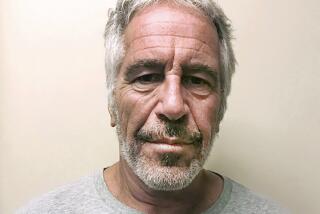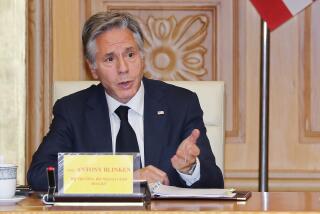US, Swiss cement deal on secret UBS bank accounts
- Share via
U.S. and Swiss negotiators have initialed a settlement that averts a legal showdown over the U.S. government’s landmark challenge to Swiss bank secrecy, a government lawyer said Wednesday.
The U.S. government had sought a federal court ruling compelling Switzerland’s largest bank, UBS, to turn over the names of Americans suspected of dodging taxes through the use of 52,000 secret accounts.
In a conference call Wednesday morning with the federal judge presiding over the case, Justice Department lawyer Stuart D. Gibson said the parties had initialed agreements and that they would ask the judge to dismiss the matter when the final documents were signed.
Terms of the deal were not immediately disclosed, leaving unclear what each side gained or conceded.
The agreement “protects the United States government’s interests,” Internal Revenue Service Commissioner Douglas Shulman said in a statement.
“We will release more details when the Swiss government signs the agreement as early as next week,” Shulman added.
The United States last year requested UBS secrets through an administrative process established under a tax treaty with Switzerland. As of February, that request had been fruitless.
One possible compromise would have the United States submit a new, narrower request for information through the same channel, with promises that the Swiss would handle the inquiry differently from before. A key question is whether such a deal would explicitly or implicitly guarantee the release of client secrets.
Tax lawyer Scott D. Michel, who represents UBS clients, said he doubted that the IRS would have settled unless it was assured of receiving details on a significant number of accounts. However, “it would be hard for the Swiss to commit in advance to a specific disclosure,” Michel said.
If the United States accedes to Switzerland’s wishes by reverting to the treaty process, lawyers advising UBS clients are eager to see what criteria, if any, the United States uses to narrow its request. The settlement could focus on accounts of a certain size with particular characteristics indicating that the holders were actively engaged in fraud -- for example, the use of shell corporations to hide the true ownership of the accounts.
But lawyers following the case, such as Bryan C. Skarlatos at law firm Kostelanetz & Fink, said they would not be surprised if those details were kept under wraps to keep depositors on edge and give them an incentive to turn themselves in to the IRS. That could lighten what might otherwise be a major enforcement burden for the agency.
The head of the Swiss Federal Department of Justice and Police, Eveline Widmer-Schlumpf, issued a statement saying that the compromise “is in the interests of both states.” UBS Chairman Kaspar Villiger thanked the Swiss negotiators “for their outstanding efforts.”
The announcement followed a long-running legal battle that had already undermined Switzerland’s legendary bank secrecy, exposed what the United States alleged was a conspiracy at the heart of Swiss banking giant UBS, and threatened to damage relations between two otherwise friendly countries.
The bank had maintained that the information the United States demanded was “protected from disclosure by Swiss financial privacy laws,” and the Swiss government had said it would prevent UBS from complying, even if a U.S. court ordered it to turn over the information.
Switzerland has been trying to protect the system of secrecy that has helped make its banking industry one of the richest in the world.
The U.S. government has been trying to catch tax evaders, collect potentially substantial amounts of unpaid taxes, and give other Americans reason to think twice before trying to hide money abroad. The Obama administration has said its effort to crack down on financial havens is an issue of fairness for honest American taxpayers.
UBS has been closing the secret accounts of its U.S. clients, forcing them into the cold, tax lawyers say. Many Americans with undeclared accounts have sought leniency by making voluntary disclosures to the IRS.
Meanwhile, UBS has reported large outflows of deposits, which go beyond its U.S. clientele.
More to Read
Inside the business of entertainment
The Wide Shot brings you news, analysis and insights on everything from streaming wars to production — and what it all means for the future.
You may occasionally receive promotional content from the Los Angeles Times.










